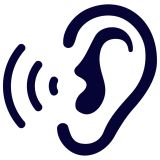In this article:
What is an Audiology Degree?
An audiology degree focuses on the study of hearing and balance disorders. This program prepares students to understand how the auditory system works, the various types of hearing problems, and how to assess and treat these issues. Students learn about anatomy and physiology related to hearing, the technology used in audiology, and the different methods for diagnosing hearing and balance disorders.
In an audiology degree program, students typically take courses in areas such as communication sciences, audiometric testing, and hearing aid technology. They also gain practical experience through supervised clinical training, where they work with patients to conduct hearing evaluations and provide treatment recommendations. This hands-on training is essential for developing the skills needed to help individuals with hearing loss or balance issues.
Program Options
Here are some common program options for an audiology degree:
- Bachelor’s Degree in Communication Sciences and Disorders: This four-year undergraduate program provides a foundation in the principles of communication, hearing, and speech. It covers topics such as anatomy of the auditory system, speech and language development, and basic audiology concepts. This degree is often a prerequisite for pursuing a graduate degree in audiology.
- Doctor of Audiology (AuD): This is a professional doctoral degree that typically takes four years to complete after earning a bachelor’s degree. The AuD program includes advanced coursework in audiology, extensive clinical training, and supervised experience in diagnosing and treating hearing and balance disorders. Graduates are prepared for certification and licensure as audiologists.
- Master’s Degree in Audiology: Some universities may offer a Master’s Degree in Audiology, which can take about two years to complete. However, most audiology positions now require a Doctor of Audiology (AuD) degree, so this option is becoming less common.
- Ph.D. in Audiology or Hearing Science: For those interested in research or academia, a Ph.D. program allows students to focus on advanced study and research in audiology, hearing science, or related fields. This program can take several years to complete and prepares graduates for roles in research, teaching, or leadership positions within the field.
- Certificate Programs: Various certificate programs may be available for audiologists looking to specialize in certain areas, such as pediatric audiology, cochlear implants, or tinnitus management. These programs provide additional training and expertise beyond the standard degree requirements.
Skills You’ll Learn
An audiology degree equips students with a range of essential skills needed to diagnose and treat hearing and balance disorders. Here are some key skills learned during the program:
- Hearing Assessment: Students learn how to conduct various tests to evaluate hearing abilities, such as audiometric testing, tympanometry, and otoacoustic emissions testing. They gain the ability to interpret test results and identify hearing issues.
- Diagnostic Skills: The program teaches students to diagnose different types of hearing and balance disorders. This includes understanding the causes of these disorders and determining appropriate treatment options.
- Fitting and Managing Hearing Aids: Students acquire skills in selecting, fitting, and adjusting hearing aids and other assistive listening devices. They also learn how to educate patients on the proper use and maintenance of these devices.
- Rehabilitation Techniques: The degree program covers techniques for rehabilitating individuals with hearing loss. Students learn how to develop and implement personalized rehabilitation plans to help patients improve their communication skills and overall quality of life.
- Communication Skills: Effective communication is vital in audiology. Students enhance their verbal and non-verbal communication skills to interact with patients, families, and other healthcare professionals clearly and empathetically.
- Cultural Competence: Students learn to consider cultural and linguistic differences when working with diverse populations. This helps them provide sensitive and personalized care to individuals with varying backgrounds.
- Research and Critical Thinking: The program emphasizes research methods and critical thinking skills, enabling students to analyze current literature, stay informed about advancements in audiology, and apply evidence-based practices in their work.
- Ethical and Professional Practice: Students are taught the ethical guidelines and professional standards that govern audiology practice, preparing them to make informed decisions and act responsibly in their professional roles.
What Can You Do with an Audiology Degree?
An audiology degree opens the door to various rewarding career paths primarily focused on helping individuals with hearing and balance disorders. Here are some potential career options:
- Audiologist: As a licensed audiologist, you will assess, diagnose, and treat hearing and balance disorders. Audiologists conduct hearing tests, fit hearing aids, and develop rehabilitation programs for patients. You can work in various settings, including hospitals, clinics, schools, and private practices. A Doctor of Audiology (AuD) degree is required for this role.
- Hearing Aid Specialist: In this role, you help patients select and fit hearing aids, provide education on their use and maintenance, and offer ongoing support. Hearing aid specialists typically work in audiology clinics or retail settings and may require certification but not necessarily a doctoral degree.
- Pediatric Audiologist: Specializing in working with children, pediatric audiologists assess and treat hearing disorders in infants, children, and adolescents. They use specialized testing methods suitable for younger patients and may work in hospitals, schools, or pediatric clinics.
- Research Audiologist: If you’re interested in the scientific aspects of audiology, you can pursue a career in research. Research audiologists conduct studies to advance knowledge in hearing and balance disorders, working in academic institutions, laboratories, or research organizations. This role may require a Ph.D. for those focused on independent research.
- Industrial Audiologist: Working in industrial settings, you can help monitor and prevent noise-induced hearing loss among employees. This role involves assessing workplace noise levels and developing hearing conservation programs.
- Tinnitus Specialist: In this specialized role, you work with patients experiencing tinnitus (ringing in the ears). You help develop management strategies and treatment plans tailored to their specific needs.

